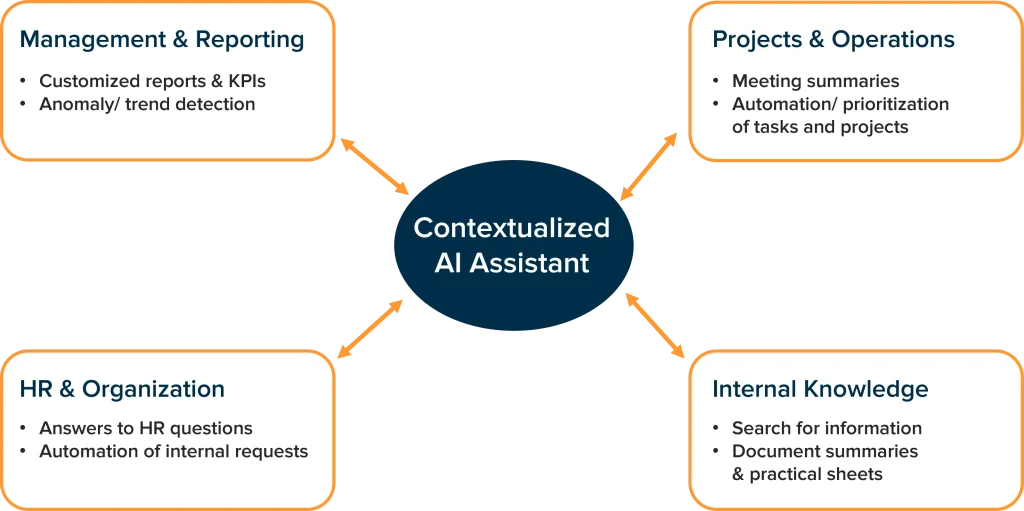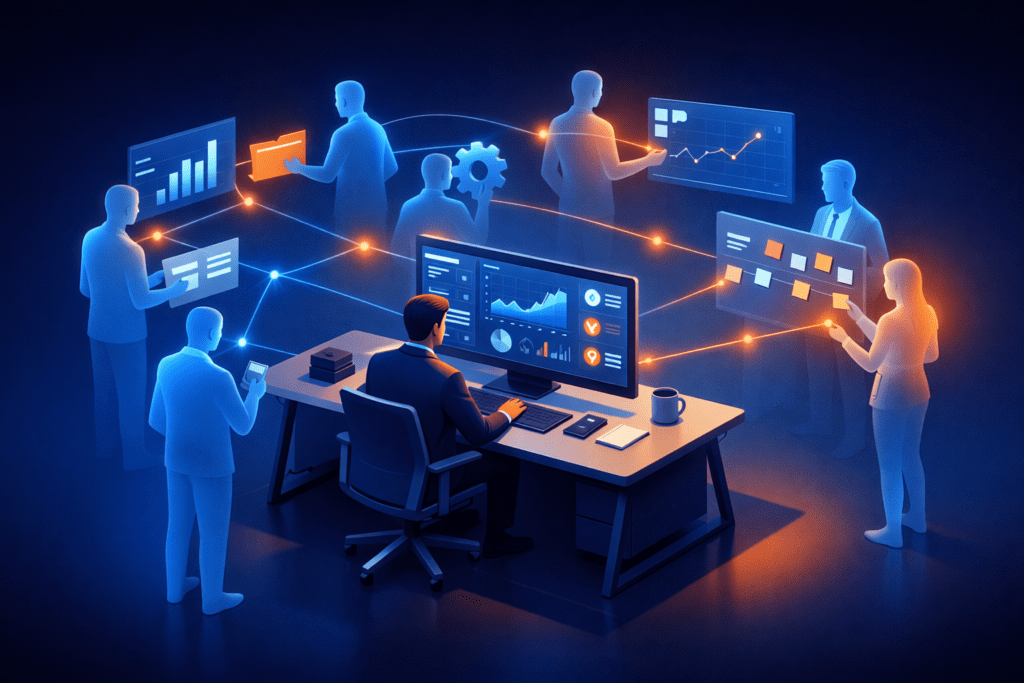Imagine if every employee had an assistant able to anticipate their needs, execute complex tasks, and deliver real-time insights.
This is no longer science fiction. Conversational and operational AI is already here—ready to transform business management. ChatGPT, Microsoft Copilot, Claude, Gemini… these AI systems are no longer just answering questions; they are integrating into business tools, reshaping how we work.
According to McKinsey, 72% of global organizations have already implemented AI in at least one business function.
👉 Facing this growing complexity, one question emerges: How can AI become your right-hand partner in daily business?
What is an AI Assistant in Business?
Unlike a basic conversational chatbot, a business AI assistant is more than just a response engine. It is an intelligent, integrated, and action-oriented tool within your work environment. It is :
- Contextualized to your business (your industry, processes, and terminology)
- Connected to your internal data (CRM, ERP, HR databases, documents, etc.)
- Operational, able to act (automate, recommend, alert…)
1. What an AI Assistant can actually do
A smart AI assistant doesn’t just answer generic questions, it understands your business and takes action. It becomes a proactive, contextualized operational partner.
Here’s what it can do :

➡️Leadership & KPIs
- Generate custom reports instantly from a single prompt
- Detect anomalies or trends in your data
- Automate tracking of strategic objectives
➡️ Projects & Operations
- Summarize team meetings and progress updates
- Suggest and prioritize tasks by urgency and milestones
- Automate routine tasks (e.g., sending follow-up emails)
- Prepare sprint meetings automatically
- Answer queries like: “Who’s working on Project X?” or “What are this week’s deliverables?”
➡️ Internal knowledge
- Perform intelligent searches and extract business-specific data from internal documents (PDFs, meeting notes, procedures)
- Summarize or create quick-reference sheets from large documents (presentations, specifications, reports)
➡️ HR & Organization
- Assist in tracking annual performance reviews
- Automate internal requests (tickets, leave, approvals)
- Answer HR or operational questions in natural language: “How many leave days do I have left?”, “What’s the onboarding process for new employees?”
2. Why AI Contextualization is key
A generic chatbot can hold a conversation, but it often struggles with the specifics of your industry.
Contextualized AI is trained on your data, documents, business rules, processes, and priorities. It is AI that understands your reality.
It does not just respond in natural language: it accurately interprets your requests, acts according to your rules, and adapts to each department (HR, finance, support, management, etc.).
Here are some examples:
- HR : understands local labor laws, internal procedures, leave calculations.
- Project Management : knows your agile methods, milestones, sprints, dependencies.
- Finance : detects anomalies based on sector-specific ratios.
- Public Administration : understands regulations, approval workflows, and sector-specific processes.
🎯 Result: AI becomes an augmented team member, not just a generic tool.
AI Assistant : Powerful partner, with conditions
While AI assistants offer significant productivity gains, success requires understanding their limitations.
1. Data Security
➡️AI Assistants must be deployed with secure, segregated hosting and strict governance.
2. Business Alignment
➡️AI must be trained on your environment with precise business rules & processes.
3. The Autonomy illusion
➡️AI assists, it doesn’t replace critical human decision-making.
4. Team Adoption
➡️AI should be seen as a support tool by employees, not a threat.
How AI is Redefining Management Practices?
The arrival of AI assistants is not just a technological innovation. It is a paradigm shift in the way we work, manage, collaborate, and run our businesses.
Aspect | Before AI | After AI |
Decision & Monitoring | Manual reporting, delayed decisions | 📊 Real-time alerts, intelligent recommendations |
Information Organization | Data silos, disconnected tools | 🔄 Unified vision, cross-data collaboration |
Individual Productivity | Repetitive tasks, mental overload | ⚙️ Automation, focus on analysis & creativity |
Operating Mode | Reactive organization | 🔮 Proactive, predictive management |
Time Management | Time spent on low-value tasks | ⏱ More time for high-value work |
Scalability | Hiring required for growth | 📌 AI assistant scales with the company |
Employee Experience | Tool friction, wasted time | 🚀 Smooth experience, instant access to info and documents |
…Towards an “Augmented” Business
An AI assistant isn’t a gadget.
It doesn’t just respond, it understands your business, integrates with your tools, and acts contextually.
No more silos or disconnected tools : the future belongs to intelligent work environments where AI works hand in hand with your teams.
This is exactly the vision we’re bringing to life with Elix : a modular platform where each micro-application can be enhanced with a dedicated, business-specific AI assistant.
Stay Tuned…
Content
Instead of one central brain, Multi-Agent Systems (MAS) offer a different approach. Intelligence is distributed across multiple autonomous agents that collaborate, adapt, and act in parallel. For business management, this enables faster decisions, higher resilience, and measurable efficiency gains.
Every day, professionals receive dozens of emails that quietly contain tasks: “Can you send the report by Thursday?”, “Let’s review this next week.” Most of these requests never become structured tasks or calendar events. They remain buried in inboxes, flagged, forwarded, or even forgotten.
Ready to see how an AI assistant can transform your organization?

